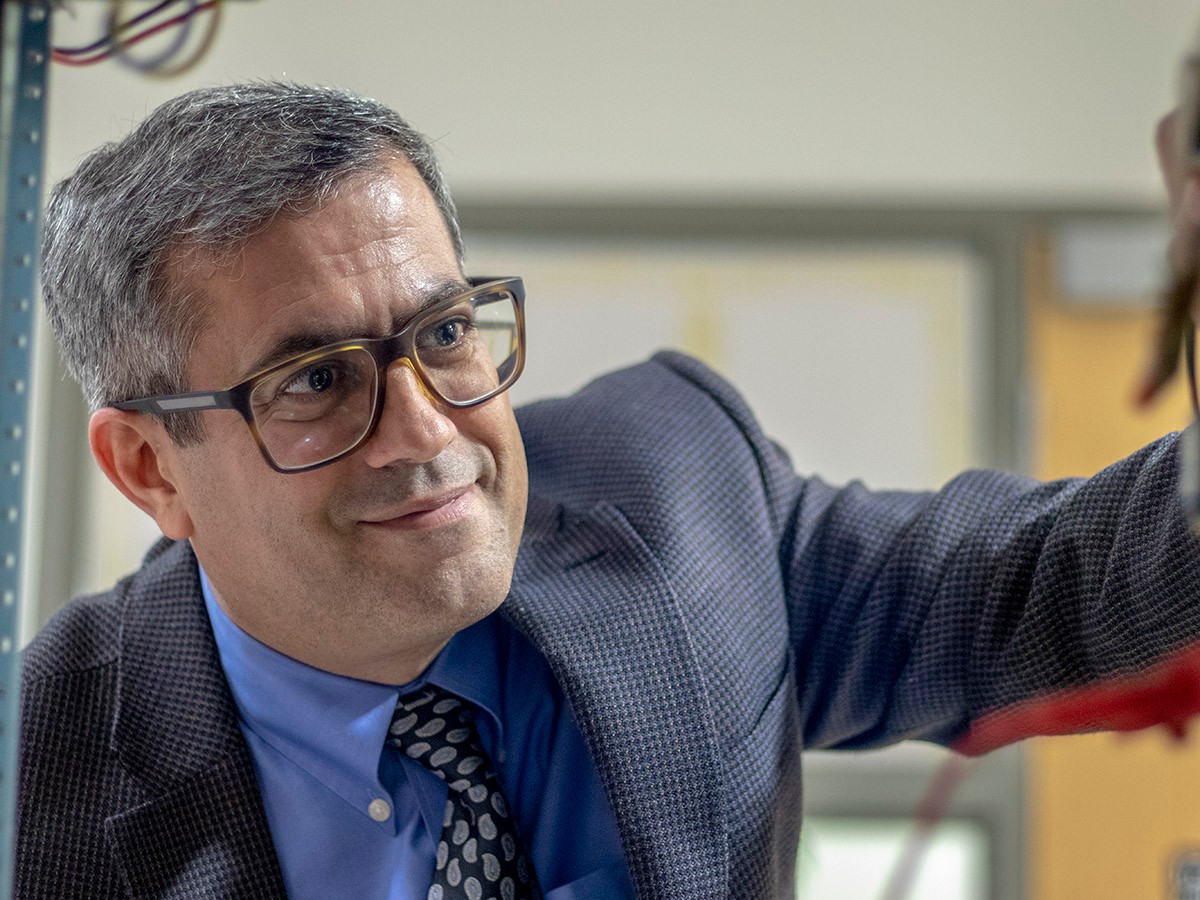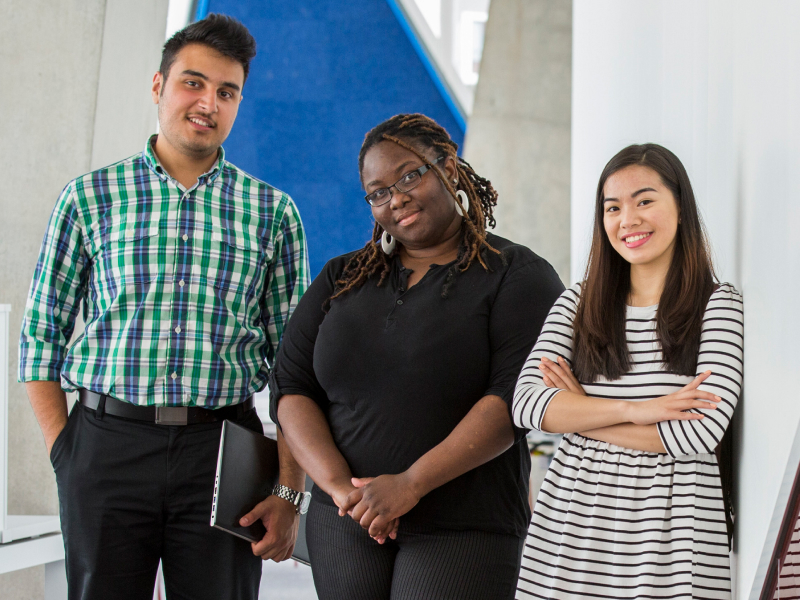Electrical Engineering Undergraduate Degree Program
FEAS > Programs > Undergraduate > Electrical Engineering
What makes this program different?
Electrical Engineering students learn to develop and design electrical and electronics systems that build the world’s infrastructure and facilities such as smart grids, autonomous vehicles, wearable technology, robotic devices, and renewable energy systems.
Degree
Bachelor of Engineering (BEng)
Department
Electrical, Computer, and Biomedical Engineering
Accreditation
Canadian Engineering Accreditation Board (external link)
(external link) Options
FT 4yrs, Co-op 5 yrs, optional specializations
Paid experience with industry partners
Students learn at the forefront of technology learning from top-tier professors, gaining hands-on experience alongside industry leaders, building their professional brand and getting paid while they do it.
Learn more about the paid co-op program and the electrical undergraduate internship.
State-of-the art facilities
Students can explore their own passions, contribute to revolutionary research, and practice classroom theories in our cutting-edge labs and facilities.
Learn about our labs.
#1 in Ontario for dedicated & personalized student support
The First Year Engineering Office (FYEO) caters to all first year academic and administrative needs, ensuring a successful transition from high school student to thriving future engineer!
First year students also benefit from first year intervention and transition programs that help students maintain and upgrade their academic standing.
Funding for your studies & business ideasExplore scholarships, awards, income opportunities, and financial assistance options to finance your studies. |

Explore your journey
The co-operative (co-op) & internship program offers engineering students 8, 12 & 16 months of paid, full-time on-the-job experience, to develop skills, build professional connections and gain confidence in their chosen discipline.
The Optional Specialization in Management Sciences (OSMS) focuses on engineering and operations management, operations research, finance and organizational behaviour and prepares students for engineering leadership.
The Accelerated Masters of Applied Science Pathway helps research-minded students, who have a minimum CGPA of A-, earn a Master of Applied Sciences up to one year earlier.
A Professional Engineer (P.Eng) License (external link) is a professional designation for engineering graduates through Professional Engineers Ontario (PEO). Graduates can choose to pursue this license, subject to PEO requirements, because our program is accredited.
The first year transition program is designed to help students who may be struggling with the pace of university learning, have missed credits, or need to improve their academic standing. This program ensures that students have the tools and guidance they need to succeed and remain on track in their studies.
In the first and second years, students learn engineering fundamentals, like calculus, physics, and electric circuit analysis, electric and magnetic fields, and basic electronics.
In the third and fourth years, students gain specialized knowledge in such topics as electric energy conversion, signal processing, control theory, communication systems, electromagnetics, microcomputer systems, electric power devices and systems, and microwaves. Students can choose to pursue valuable, paid work experience in an optional co-operative internship program or research internship.
In the final year, students further specialize in their field of interest and collaborate with peers on a comprehensive design project, further training them to be well-equipped to launch careers and become leaders of tomorrow. Full course descriptions are available on the undergraduate calendar.

The electrical engineering field and electrical engineers have been the driving forces behind some of the most impactful innovations that have shaped the way we live today. With the new and emerging challenges we face towards a more connected, powered, sustainable world, become a part of the drive through a solid curriculum in the early years, a great variety of elective specialized courses in the fourth year, well-equipped labs, student clubs, and an optional co-op/internship program.

Get involved!
Engineering students deepen their applied knowledge of electrical engineering and meet new people by participating in design teams, competitions and student groups, including:
- Engineers Without Borders (EWB) (external link)
- EngOut (external link)
- IEEE Computer Society TMU Chapter
- IEEE TMU Electronics Chapter
- IEEE Toronto Metropolitan University Student Branch
- National Society of Black Engineers (external link)
- TMU International Hyperloop Team (RIHT) (external link)
- TMU Supermileage SAE (external link)
- TMU Thrill Club (external link)
- Women in Engineering (WiE) (external link)
Selected Competitions

Get help!
Program-specific, career development, personal counselling and more, TMU is #1 in Ontario for providing support throughout your student journey.

Clusters & zones
Students and faculty tackle real-world problems through our four zones and six centres by joining forces with leading organizations, from industry and hospitals to community and government. Our students receive one-on-one mentorship from multidisciplinary experts, and use state-of-the-art technologies that ignite and nurture their start-ups from the ground up.

What does an electrical engineering graduate do?
Career possibilities
Electrical engineering graduates become leaders in this in-demand field, embodying the technical skills and solutions-oriented experience needed to launch careers developing algorithms, as well as designing, simulating and building prototypes for solid-state electronic devices and systems, data processing apparatus, electric power systems, electrical vehicles, manufacturing machinery, telecom networks, and much more.
With theoretical knowledge and hands-on technical expertise, our graduates carve out traditional and emerging engineering careers and take a holistic approach in recognizing how their designs and decisions impact people and society.
Possible employers:
TMU’s electrical engineering graduates work for a variety of leading companies including:
- AMD
- Apple
- Enbridge
- GE
- Hydro One
- Ontario Power
- Generation
- Tesla
- + More

Hussam Haroun
Senior Vice President of Engineering for SunGrid Solutions, Inc
“Electrical engineering is a diverse field with many opportunities for new grads in computer networks, computer systems, electrical systems and more.”
Electrical Engineering (BEng) ’08

Anza Syed,
(external link) Software Development Engineer, Ford Motor Company
“The extracurricular activities offered by Toronto Metropolitan University Engineering enriched my professional development.”
Electrical Engineering (BEng) ʼ20
$10M for entrance scholarships
We offer more than $10M in academic-based entrance scholarships.
$28k for current students
We also offer more than $28k in electrical engineering awards. Look for one of our eight awards on the university’s scholarships and awards platform. (external link)
Earn income & develop career-related skills
Undergraduate research assistantships are available for third year students with a CGPA of 3.0 or more.
The Career Boost program provides jobs to eligible full-time undergraduate students.
Get financial assistance
Get info on government financial aid programs such as OSAP, out-of-province student loans, and U.S. student loans.








